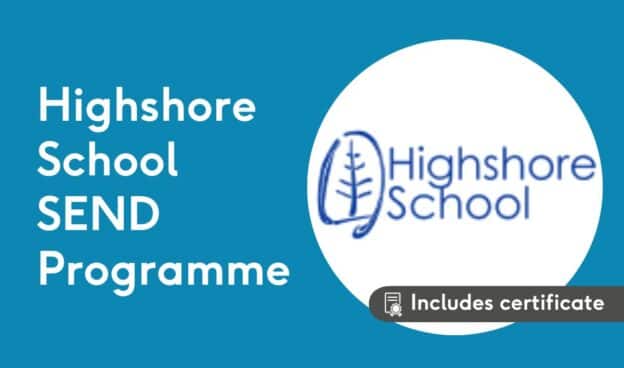The Highshore School SEND Programme is a series of lessons designed to enhance the skills and knowledge of colleagues working with children with Special Educational Needs and Disabilities (SEND). Each lesson is meticulously crafted to provide practical insights and strategies, ensuring that participants are well-equipped to support the diverse needs of their students.
Course Structure:
- Lesson Duration: Approximately 30 mins – 1 hour each with a quiz following the lesson
- Certification: Each lesson comes with a certificate of completion. Participants who complete the entire course will receive an additional certificate recognising their comprehensive understanding and commitment.
Lesson Details:
- What do educators needs to know about EHCPs?
- Overview: Education, Health, and Care Plans (EHCPs) are essential tools designed to support children and young people with special educational needs and disabilities (SEND). These legally binding documents outline the specific educational, health, and social care needs of the individual and detail the support required to meet those needs. Understanding EHCPs is crucial for educators to ensure that all students receive the appropriate support to thrive in their educational journey.
- Key Topics
- Understanding the EHCP Process
- Definition and purpose of EHCPs
- Implementing and Monitoring EHCPs
- Autism Re-Explained
- Overview: This lesson reexamines what we understand by the term ‘Autism’. The question you may ask, should you have worked in education supporting children with autism is, ‘Why do we need to re-examine this?’. When we have so many needs in a classroom, is it really imperative to understand what impact autism has at all?
- Key Topics:
- Characteristics and spectrum of autism
- Communication and social interaction strategies
- Sensory sensitivities and accommodations
- Multi-Sensory Needs
- Overview: This lesson addresses the diverse sensory needs of students with SEND. Participants will learn how to create multi-sensory learning experiences that cater to different sensory preferences and enhance student engagement.
- Key Topics:
- Understanding multi-sensory needs
- Designing multi-sensory activities
- Adapting the learning environment for sensory needs
- De-Escalation Techniques: Bringing Down the Temperature
- Overview: This lesson focuses on practical de-escalation techniques to manage challenging behaviours effectively. Participants will learn strategies to reduce tension and prevent escalation, ensuring a safe and supportive learning environment.
- Key Topics:
- Understanding triggers and early signs of escalation
- Techniques for calming and de-escalating situations
- Creating a positive and proactive classroom environment
- An Introduction to ADHD
- Overview: Attention-Deficit/Hyperactivity Disorder (ADHD) is a common neurodevelopmental condition that affects both children and adults. It is characterised by symptoms of inattention, hyperactivity, and impulsivity, which can impact various aspects of daily life, including academic performance, work, and social interactions. This lesson will provide an introduction to ADHD, helping educators and caregivers understand its characteristics, diagnosis, and management strategies.
- Key Topics:
- Understanding ADHD
- Diagnosis and Treatment of ADHD
- Impact of ADHD on Learning and Development
- Understanding Dyscalculia
- Overview: Dyscalculia is a specific learning disability that affects an individual’s ability to understand and perform mathematical tasks. Similar to dyslexia, which impacts reading, dyscalculia involves difficulties with number-related concepts and arithmetic. This lesson aims to provide a comprehensive understanding of dyscalculia, its impact on learning, and effective strategies for supporting students with this condition.
- Key Topics:
- Characteristics and Diagnosis of Dyscalculia
- Impact of Dyscalculia on Learning and Daily Life
- Strategies for Supporting Students with Dyscalculia
- Early Identification of SEND
- Overview: Early identification of Special Educational Needs and Disabilities (SEND) is crucial for providing timely and effective support to children and young people. Recognising and addressing these needs at an early stage can significantly improve educational outcomes, promote inclusion, and enhance overall well-being. This lesson will explore the importance of early identification, the processes involved, and strategies for educators and caregivers.
- Key Topics:
- Importance of Early Identification
- Processes and Tools for Identifying SEND
- Strategies for Effective Early Identification
- The Graduated Response
- Overview: The Graduated Response is a systematic approach used in education to identify and support students with special educational needs and disabilities (SEND). It involves a step-by-step process of assessment, planning, intervention, and review to ensure that students receive the appropriate support tailored to their individual needs. This lesson will provide an in-depth understanding of the Graduated Response, its importance, and practical strategies for implementation.
- Key Topics:
- Understanding the Graduated Response
- Implementing the Graduated Response in Schools
- Collaborative Approaches and Best Practices
By completing the Highshore School SEND Programme, participants will not only receive individual certificates for each lesson but also an additional certificate recognising their dedication to professional development in the field of SEND. This programme is an invaluable resource for educators committed to fostering an inclusive and supportive educational environment.
Enjoy the course, you can take the lessons in any order and at any time.


